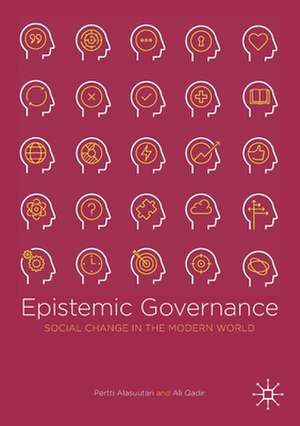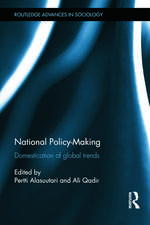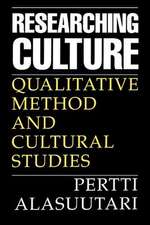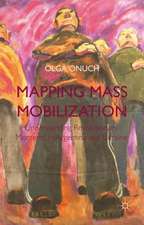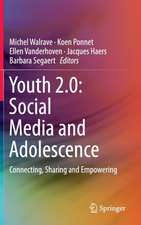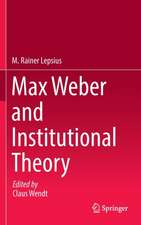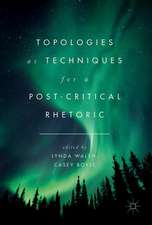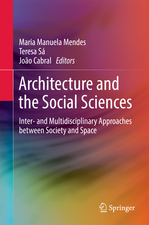Epistemic Governance: Social Change in the Modern World
Autor Pertti Alasuutari, Ali Qadiren Limba Engleză Paperback – 7 oct 2019
Alasuutari and Qadir show how this epistemic governance works in three important arenas of social change: parliaments, which debate laws that constitute the bulk of reforms; international organizations that circulate global norms; and social movements and NGOs. Through their analysis, the authors’ detailed, innovative methodology for discourse analysis indicates the utility of epistemic governance as a new paradigm for research into global social change.
This book will be of use to students in upper level degree programs who want to design empirical research into social change as well as researchers in sociology, political science and public policy.
Preț: 465.80 lei
Preț vechi: 548.01 lei
-15% Nou
Puncte Express: 699
Preț estimativ în valută:
89.13€ • 97.12$ • 75.11£
89.13€ • 97.12$ • 75.11£
Carte tipărită la comandă
Livrare economică 23 aprilie-07 mai
Preluare comenzi: 021 569.72.76
Specificații
ISBN-13: 9783030191498
ISBN-10: 3030191494
Pagini: 192
Ilustrații: X, 192 p. 1 illus.
Dimensiuni: 148 x 210 x 14 mm
Greutate: 0.27 kg
Ediția:1st ed. 2019
Editura: Springer International Publishing
Colecția Palgrave Macmillan
Locul publicării:Cham, Switzerland
ISBN-10: 3030191494
Pagini: 192
Ilustrații: X, 192 p. 1 illus.
Dimensiuni: 148 x 210 x 14 mm
Greutate: 0.27 kg
Ediția:1st ed. 2019
Editura: Springer International Publishing
Colecția Palgrave Macmillan
Locul publicării:Cham, Switzerland
Cuprins
1. Introduction.- 2. Epistemic Work.- 3. Imageries of the Social World. - 4. Authority as Epistemic Capital.- 5. International Organizations.- 6. Parliaments.- 7. Social Movements and NGOs.- 8. Epistemic Governance as a Methodological Toolkit.
Notă biografică
Pertti Alasuutari is Professor of Sociology at the Faculty of Social Sciences,Tampere University, Finland. He has published widely in the areas of social theory, cultural and media studies, and social research methodology.
Ali Qadir is Associate Professor of New Social Research, Tampere University, Finland. Qadir’s research centers on epistemic governance in modern world society and on religion in modernity. He has published widely in global and transnational sociology, and in sociology of religion.
Ali Qadir is Associate Professor of New Social Research, Tampere University, Finland. Qadir’s research centers on epistemic governance in modern world society and on religion in modernity. He has published widely in global and transnational sociology, and in sociology of religion.
Textul de pe ultima copertă
This book argues that modern governance is performed by actors who seek social change epistemically, by drawing on widespread, public views of reality. Agents of change such as parliamentarians or social movement activists will assess and affect what they believe to be people’s conceptions of what is possible, rational, and desirable. This often means that these key authority figures will invest in credible knowledge production, as well as appeal to individual and group identifications, emotions, and values.
Alasuutari and Qadir show how this epistemic governance works in three important arenas of social change: parliaments, which debate laws that constitute the bulk of reforms; international organizations that circulate global norms; and social movements and NGOs. Through their analysis, the authors’ detailed, innovative methodology for discourse analysis indicates the utility of epistemic governance as a new paradigm for research into global social change.
This book will be of use to students in upper level degree programs who want to design empirical research into social change as well as researchers in sociology, political science and public policy.
Alasuutari and Qadir show how this epistemic governance works in three important arenas of social change: parliaments, which debate laws that constitute the bulk of reforms; international organizations that circulate global norms; and social movements and NGOs. Through their analysis, the authors’ detailed, innovative methodology for discourse analysis indicates the utility of epistemic governance as a new paradigm for research into global social change.
This book will be of use to students in upper level degree programs who want to design empirical research into social change as well as researchers in sociology, political science and public policy.
Caracteristici
Presents an insightful overview of the different fields and sub-fields that attend to global social change Bridges the macro institutional and the micro interactional levels across theoretical, conceptual and empirical chapters Designed to be used by researchers or those in upper level degree programmes who want to think critically about empirical evidence, an approach that is often reserved for methodology courses
